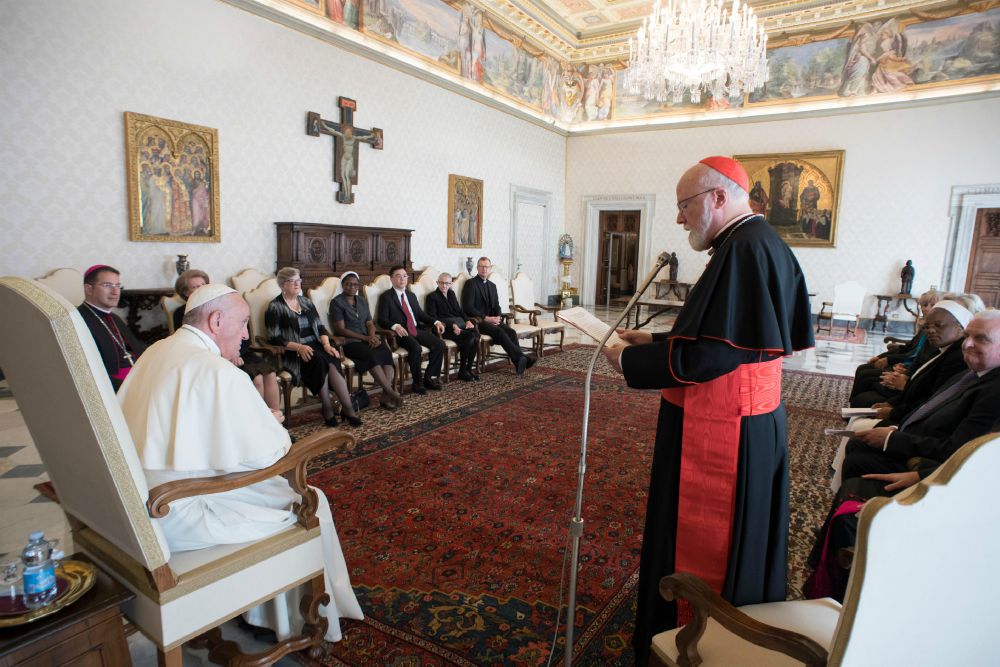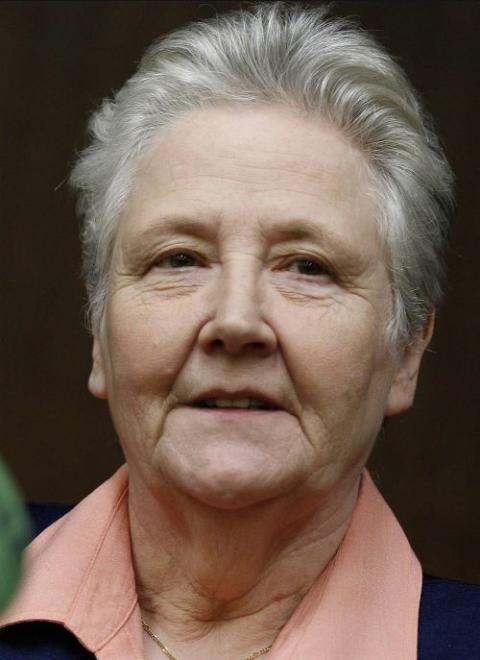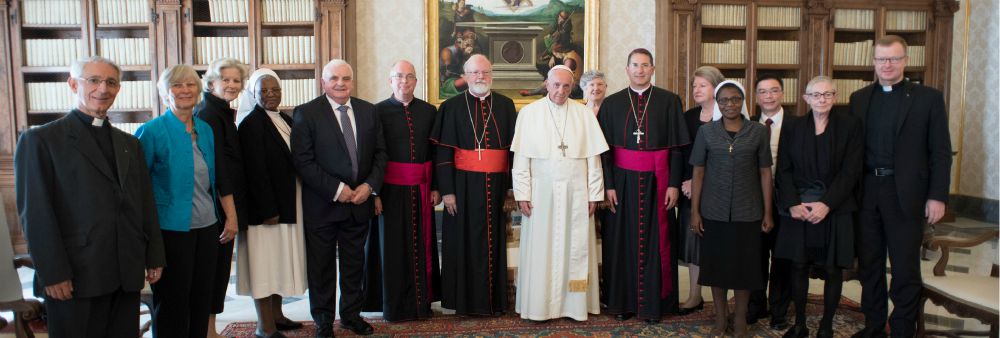
Pope Francis listens as Cardinal Sean O'Malley of Boston, president of the Pontifical Commission for the Protection of Minors, speaks during an audience with commission members at the Vatican Sept. 21. (CNS/L'Osservatore Romano, handout)
The clergy abuse survivor who resigned in frustration from the Pontifical Commission for the Protection of Minors last March has expressed concern about a proposal to restructure the group so it no longer includes direct involvement of survivors.
In an interview with NCR, Marie Collins said she worries the possible change to put survivors on a new advisory panel separate from the commission might mean they are not consulted on every issue the group considers.
"I feel it is a backward step," Collins said in an email conversation Oct. 3.
"The importance of a survivor voice in the commission was recognized when it was set up," said Collins. "It is still just as important that this perspective is included in their deliberations."
"My fear would be that a panel could be relegated to involvement only in items deemed as suitable for them while the rest of the work would go without any survivor input," she continued.
Collins, who had been the last active member of the commission who is an abuse survivor, resigned from the group March 1. In a statement she wrote for NCR at the time, she said she decided to leave the commission after losing hope that Vatican officials would cooperate with its work.
Collins was writing in the interview in response to a question about recent remarks by current commission member Krysten Winter-Green, who told NCR in an Aug. 14 interview that the group had been weighing the pros and cons of removing the direct involvement of survivors and placing them on a separate advisory panel.
Collins also wrote in the interview about the possibility that the structure of the commission may change in coming months, following the completion of the group's original three-year mandate.
She suggested that the commission should be given power to audit how the Vatican implements its recommendations after the pope approves them. She also expressed concern that the Vatican office for the commission should not play too big a role in decision-making on behalf of the group.
Advertisement
"The most retrograde change would be any attempt to transfer responsibility for policy planning or decision-making on how work is undertaken from the members to the Vatican's office for the commission," said Collins. "If this loss of independence happened it would, in my view, totally undermine the commission's credibility."
Following is NCR's full interview with Collins.
NCR: What did you think of the news that the commission is considering restructuring so that it no longer has the direct participation of survivors, but instead puts them on a separate advisory panel?
Collins: I feel it is a backward step. The importance of a survivor voice in the commission was recognized when it was set up. Moving into its second term it is still just as important that this perspective is included in their deliberations.
Do you think there are ways the commission could still be a credible voice under that model, without the direct participation of survivors?
My fear would be that a panel could be relegated to involvement only in items deemed as suitable for them while the rest of the work would go without any survivor input. In my view, a panel would need to be kept informed on all of the commission's work, then be free to discuss and input their views on anything they consider relevant to them.
In the statement you wrote for NCR when you left the commission you said you had decided to leave because you had come to a point where you could "no longer be sustained by hope" that the commission would have an impact on the Vatican. Do you see any points of hope following the pope's Sept. 21 meeting with the commission?
The pope has always backed the commission and its recommendations for change. This commitment was confirmed even more strongly by his statements at this meeting.
However, the problem has been the lack of commitment by those delegated by him to implement these changes. The litmus test for me to judge if he has overcome this would be to see: First, a mechanism for holding church leaders accountable, operating transparently and justice being seen to be done; and second, best practice safeguarding policy guidelines being implemented consistently across the church with clear sanctions for any leader negligent in implementation.
The hindering of movement on these two issues within the Vatican was not challenged by the commission and this led to my losing hope in its effectiveness. If this has changed then I would begin to hope again but we do not know.

Marie Collins, 2012 (CNS/Tony Gentile, Reuters)
The original three-year mandate for the commission's current members is coming to an end. Do you have any hope that will lead to significant changes to the commission? What changes would you like to see in order to make the commission more effective or credible?
The commission has been working under temporary ad experimentum statutes. This means permanent statutes are due and these may be in place for the new term of commission beginning Dec. 17. New statutes could change the structure or working methods of the commission so it will be interesting to see what they contain.
I would like to see an annual report issued by the commission detailing, as far as possible, the work undertaken, the recommendations made to the Holy Father and the outcomes. I would also like to see an update in respect to the progress of the recommendations approved by the Holy Father. For example, is the directive by the pope to acknowledge communications from victims/survivors now followed by all dicasteries?
It would also be very valuable if the commission were given the power to audit the implementation of their recommendations.
These changes would add a great deal to the credibility of the commission. In the Vatican there can be an obsession with secrecy that is often counterproductive, as even good news remains obscured.
The most retrograde change would be any attempt to transfer responsibility for policy planning or decision-making on how work is undertaken from the members to the Vatican's office for the commission. There were indications before my resignation that things might be tending in this direction. If this loss of independence happened it would, in my view, totally undermine the commission's credibility.

Pope Francis poses with members of the Pontifical Commission for the Protection of Minors during an audience at the Vatican Sept. 21. (CNS/L'Osservatore Romano, handout)
If they do decide to add a survivor to the commission again, what advice might you offer that person?
Ensure you are prepared for slow progress and realize that the ways of the Vatican are not the ways of the secular world, so frustration is inevitable.
In his address to the commission Sept. 21, the pope admitted that the "old practice" of the church had been to "move people around" instead of reporting abusive priests to authorities. The pope also admitted that the church had taken too long to take "consciousness" of the problem of sexual abuse. Do these admissions have significance for you?
The pope's statements — that the church had been slow and the even more important admission that there had been a "practice of moving people around" instead of dealing properly with abusive priests — were significant. Not because any of it was news to survivors who have been saying this for decades. But the significance lay in the fact that the latter admission was the first time a pope or any church leader, as far as I know, has confirmed that moving abusers was systemic and not just the occasional misjudgment of a particular bishop.
Hopefully we will see those who have continued to defend and minimize this policy follow the pope's lead on this and recognize the truth of the past.
What did you think of the pope's reasoning for why the responsibility for abuse cases must remain with the CDF [Congregation for the Doctrine of the Faith], until the entire church has taken consciousness of the "graveness" of the problem of sexual abuse?
What struck me about this statement was the admission it contained that the entire church has not yet accepted the "graveness" of the problem of sexual abuse. In 2017, this is very depressing but obviously a statement of the truth and a confirmation of what so many of us already know.
To most people it does not matter who is dealing with abuse cases as long as they are dealt with efficiently, with justice and in a timely manner.
Is the pope's declaration that a priest who has been "proven" to have abused a minor will not have recourse to appeal helpful?
I interpreted this comment as meaning once a priest has been proven to have abused a minor there should be no appeal to reduce the sanction imposed. Whatever is the judgment of the canonical court as to his punishment, he should not be able to have that reduced by means of appeal. This is in line with the pope's statement about never pardoning an abuser and is an indication of his acceptance of the harmfulness and seriousness of abuse.
[Joshua J. McElwee is NCR Vatican correspondent. His email address is jmcelwee@ncronline.org. Follow him on Twitter: @joshjmac.]





